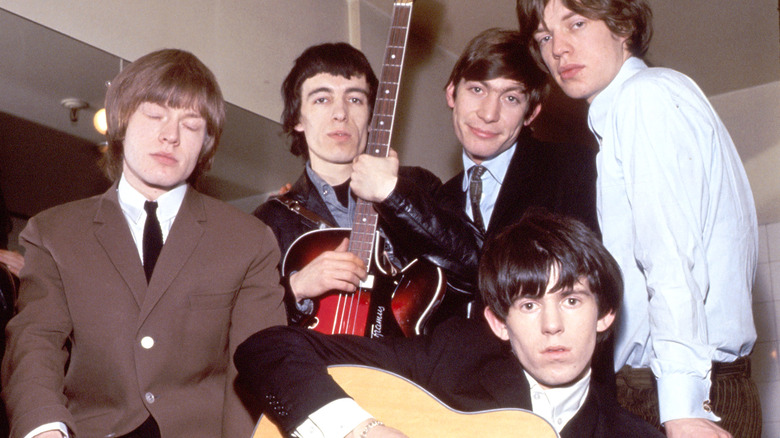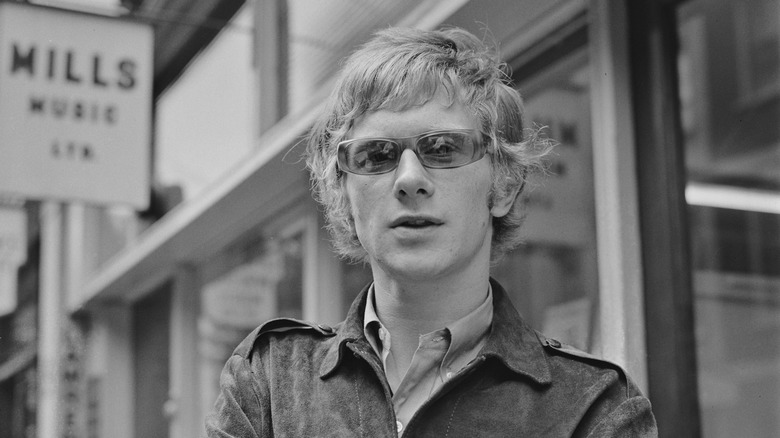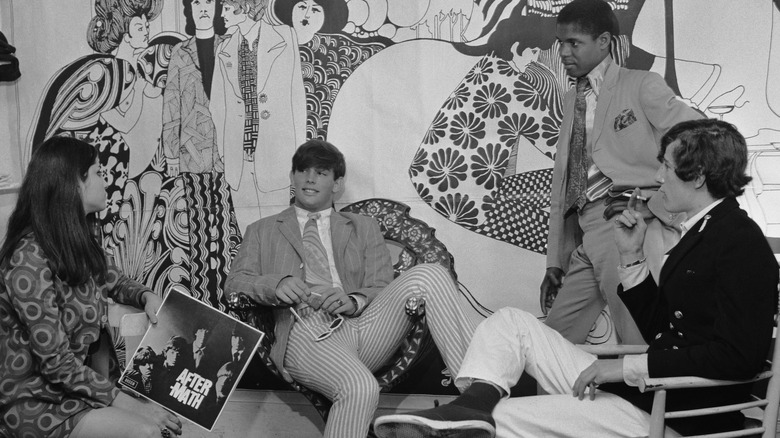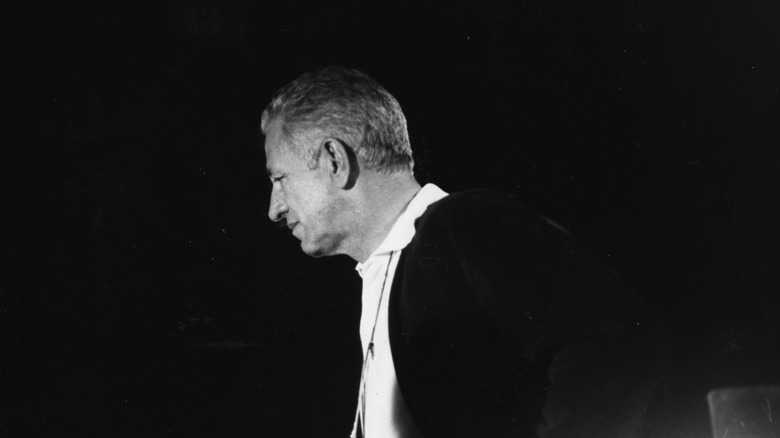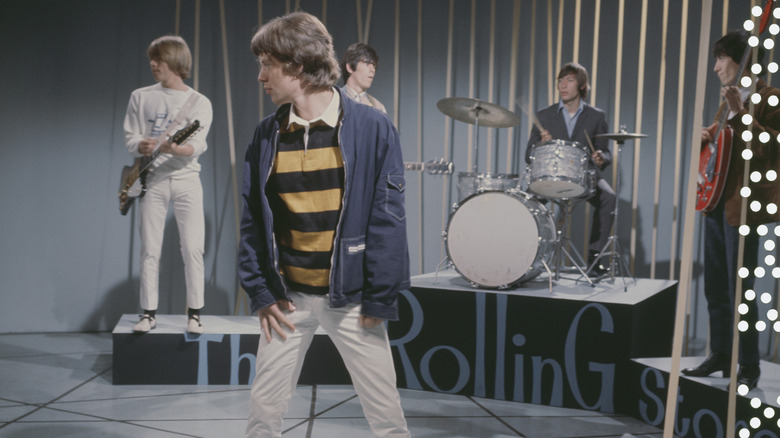The Rolling Stones Movie We'll Never Get To See
By the summer of 1966, everything seemed to fall into place for the Rolling Stones' first feature film. Unlike the Beatles' 1964 film debut, "A Hard Day's Night," a slap-stick frolic that drew comparisons with Marx Brothers' films, the Stones had opted for a darker, hard-hitting project based on a dystopian novel called "Only Lovers Left Alive," according to The Guardian. Hollywood's Nicholas Ray was set to direct the film with a screenplay by two well-regarded English writers, per a 1966 article in The Morning Call.
The novel by Dave Wallis, which was published in 1964, revolved around the death by suicide of everyone over 20 years old, leaving teenagers to rule England with devastating results. Roving motorcycle gangs battle it out for supremacy amid a quickly disintegrating infrastructure where "lipstick, gasoline and food" are "now the currency in a new world of unspeakable violence," according to the book's publisher, Valancourt Press. It was an interesting choice for a band that was then in its ascendancy.
If you or anyone you know is having suicidal thoughts, please call the National Suicide Prevention Lifeline by dialing 988 or by calling 1-800-273-TALK (8255).
By 1966 the Rolling Stones Had Lots of Ideas, But No Films
Before the announcement that the Rolling Stones planned to star in "Only Lovers Left Alive," there was talk of another film project, "Back, Behind, and In Front." According to The Cincinnati Post, this film was to be based on a story dreamed up by the band's manager and producer, Andrew Loog Oldham. They planned to shoot the film in both black and white and color, with filming to take place in England and "four countries behind the Iron Curtain" — the term used during the Cold War to indicate countries under the control of the Soviet Union — with a 10-week shooting schedule to begin in April 1966, per The Cincinnati Post.
The recording company British Decca budgeted $1.25 million ($11.43 million today) for the project and also signed the Stones to a five-year film deal worth more than $5 million ($45 million today), per United Press International. The Rolling Stones even planned to write music for the earlier film idea, per the Associated Press. Unfortunately, "Back, Behind, and In Front" never came to fruition, but a groundbreaking album emerged from the ashes of this first project.
An Album But Still No Movie
The Rolling Stones' 1966 album "Aftermath" began as the soundtrack for "Back, Behind, and In Front," according to the book, "The Rolling Stones All the Songs Expanded Edition: The Story Behind Every Track." According to Blender, the band's fourth British studio album was the first made up of all original songs. The seminal album defined the band's sound, topping the charts in the U.K., reaching number two in the U.S., and bringing the band thousands of new fans, per The Telegraph.
By May 1966, the Rolling Stones quietly dropped any mentions of this first film project and moved on to touting a new movie, "Only Lovers Left Alive," per The Los Angeles Times. Andrew Oldham originally planned to buy the film rights to "A Clockwork Orange," the better-known dystopian novel by Anthony Burgess that was published in 1962, but Stanley Kubrick got to Burgess first, per The Guardian. So Oldham settled for "a second-best novel," as he told the newspaper.
What Happened to Only Lovers Left Alive?
Andrew Oldham "went the rounds, made all the noises, and met all the sacred monsters" when trying to get the Rolling Stones a film project worthy of the band, he told The Guardian in 2001. He and Mick Jagger met with the English writers Keith Waterhouse and Willis Hall but in the end, " ... [w]e thought they were old farts, and they thought us young farts, and inane," per The Guardian. Waterhouse was a successful novelist and Hall a playwright who'd begun collaborating on screenplays a few years earlier, according to Waterhouse's obituary listed in The Guardian.
Oldham and Jagger also met with the director Nicholas Ray, whose biggest hit was 1955's "Rebel Without a Cause" starring James Dean, per the 2001 article from The Guardian. But drugs and alcohol had taken their toll on the Hollywood director, who had a heart attack three years earlier on the set of his film "55 Days at Peking," according to IMDB. "He was only in his mid-50s but looked a bad 80 and a day," Oldham recalled in The Guardian. Plans moved ahead, but Oldham and the Stones eventually lost faith in Ray, the backers pulled funding, and the project died, according to the website, Please Kill Me.
The First Rolling Stones Film That Actually Got Made Had Problems
The Rolling Stones' first movie ended up being a concert film, and like the earlier attempts to get the band onto celluloid, "Charlie Is My Darling — Ireland 1965" had its own problems, according to Gary J. Jucha's book, "Rolling Stones FAQ: All That's Left to Know About the Bad Boys of Rock." Andrew Oldham hired Peter Whitehead to shoot what Oldham thought of as an extended screen test in order to get the band used to being in front of a camera while they sorted out the other film projects, according to The Commercial Appeal.
Whitehead already made a documentary about the beat poets called "Wholly Communion" when Oldham enlisted him to document the Rolling Stones' tour of Belfast and Dublin in September 1965, per Whitehead's obituary in The Guardian. The Stones' documentary premiered at the 1966 Mannheim film festival in Germany, where it was up for a gold medal but lost out to Oldham's earlier documentary, per The Guardian. Then "Charlie Is My Darling" was locked away for 47 years.
Other Films Featuring the Rolling Stones
The reason why the first Rolling Stones documentary, "Charlie Is My Darling — Ireland 1965," was unavailable for nearly 50 years seems to have various answers. According to Peter Whitehead's obituary in The Guardian, he clashed with Oldham over his portrayal of the band in the film, which led to its shelving. But Please Kill Me alleges it was a fight between Oldham and the film's producer, Allen Klein, of whom owned the film rights that led to the documentary gathering dust for nearly five decades. The film was eventually digitally restored and released in 2012, per The New York Times.
While the Rolling Stones' initial foray into the film world was rocky (to say the least), by the 1970s, the Stones became cinematic superstars. The band worked with such famous directors as Jean-Luc Godard, considered a pioneer of French New Wave Cinema, for his 1968 film, "One + One" (later re-titled "The Rolling Stones: Sympathy for the Devil," per IMDB), and the Maysles brothers on 1970's "Gimme Shelter." Without his bandmates, Mick Jagger starred in several films, including the 1970's Western "Ned Kelly" and a psychedelic gangster film, "Performance," per IMDB. But "Only Lovers Get Out Alive" starring the Stones as members of a futuristic biker gang, never came to be.
